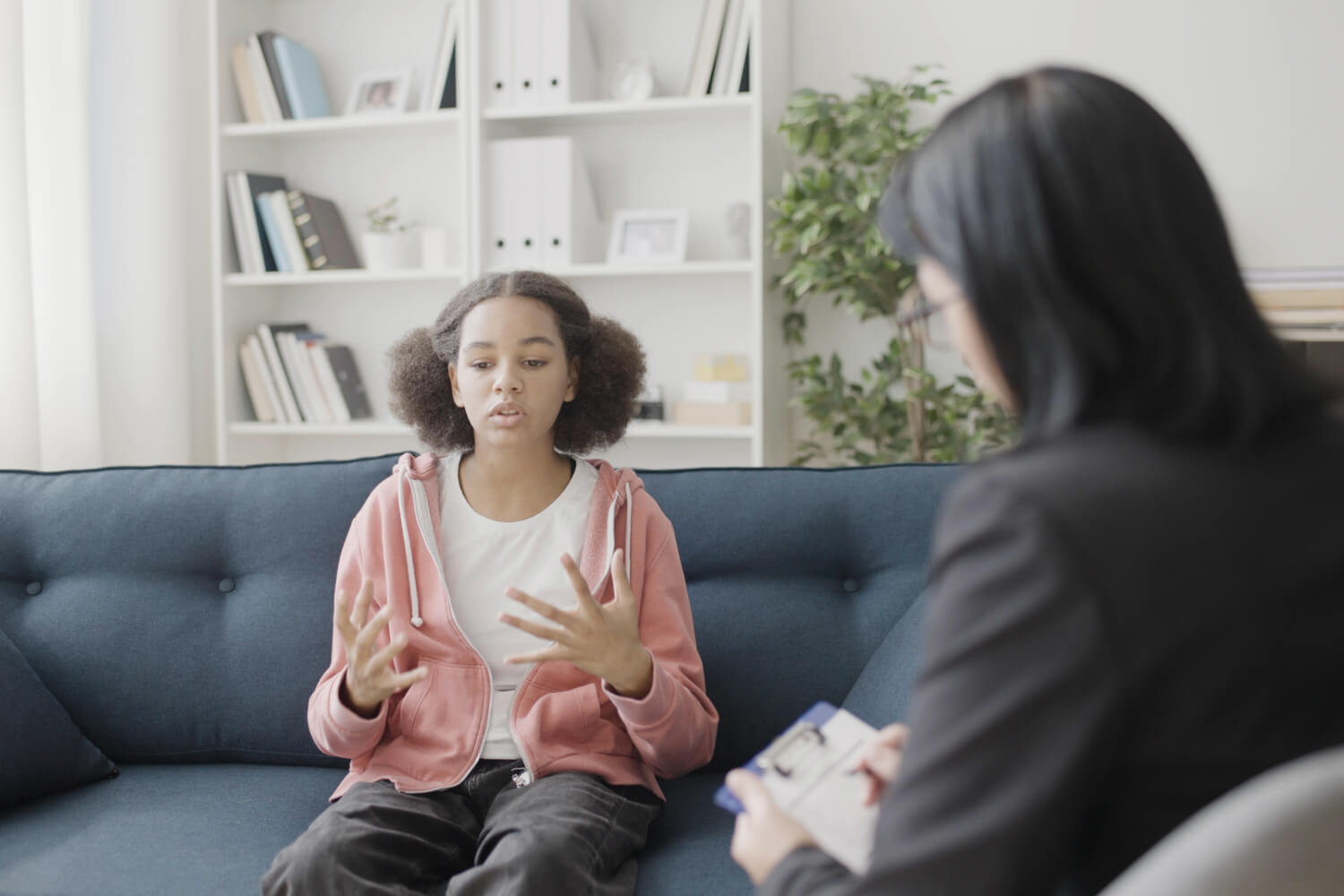Discovering the Various Sorts Of Treatment Readily Available for Teens With a Therapist for Teenagers
Teenagers face distinct obstacles that can affect their psychological health and wellness. Various restorative approaches are tailored to deal with these issues efficiently. From Cognitive-Behavioral Treatment (CBT) to Art Treatment, each technique uses unique advantages. Recognizing these therapies can help caregivers make informed decisions. What aspects should be considered when choosing the appropriate approach for a teen? The exploration of these various treatments reveals understandings that can substantially boost teen health.
Recognizing Cognitive-Behavioral Therapy (CBT) for Teenagers
Cognitive-Behavioral Therapy (CBT) acts as an effective tool for dealing with the one-of-a-kind psychological health and wellness challenges encountered by teens. This evidence-based method focuses on the interaction between feelings, habits, and thoughts, helping teenagers recognize and alter negative idea patterns that add to their struggles. Via structured sessions, specialists guide teens in recognizing their cognitive distortions, cultivating much healthier coping mechanisms and emotional law.
CBT is specifically efficient in managing anxiety, anxiety, and behavior problems, as it gears up teenagers with functional abilities to navigate their lives. The treatment urges self-reflection and advertises a positive mindset, empowering teenagers to take control of their psychological health journey. By setting details goals and using various techniques, such as journaling and role-playing, CBT promotes strength and self-awareness. In general, this healing technique supplies teenagers with vital tools to confront their challenges and build a more favorable overview on life.
The Advantages of Dialectical Behavior Modification (DBT)
While many healing methods provide important insights for teenagers, Dialectical Behavior modification (DBT) sticks out for its effectiveness in dealing with emotional policy and social difficulties. Developed by Dr. Marsha Linehan, DBT combines cognitive-behavioral strategies with mindfulness methods, making it especially appropriate for teens coming to grips with extreme emotions. This therapy aids teenagers identify and recognize their sensations, promoting healthier actions to stressors.
Among the considerable benefits of DBT is its concentrate on structure abilities in four key locations: mindfulness, interpersonal effectiveness, distress resistance, and emotional regulation. These skills encourage teenagers to browse complicated relationships and deal with tight spots better. In addition, DBT urges a solid therapeutic partnership between the specialist and the adolescent, promoting trust fund and openness. Consequently, several teenagers experience improved emotional stability and improved coping mechanisms, eventually causing a much more meeting life and stronger partnerships with peers and family.
Exploring Art Treatment as an Imaginative Outlet
Art treatment provides teenagers an one-of-a-kind avenue for self-expression and psychological expedition (Youth Counselling Near Me). With numerous techniques and methods, it enables them to connect sensations that may be tough to verbalize vocally. By engaging in creative tasks, teenagers can experience restorative advantages that advertise psychological health
Advantages of Art Treatment
Taking part in art therapy offers teenagers with an one-of-a-kind innovative electrical outlet that cultivates psychological expression and personal insight. This restorative approach allows teens to communicate feelings and experiences that may be challenging to verbalize verbally. With numerous kinds of creative expression, such as drawing, painting, or sculpting, teens can explore and process complicated emotions, bring about raised self-awareness. Additionally, art treatment advertises leisure and stress and anxiety relief, offering a risk-free space for individuals to release bottled-up feelings. The non-judgmental setting urges trial and error, assisting teenagers construct self-confidence in their creative thinking and analytic skills. Consequently, art therapy can enhance overall psychological wellness, supplying a beneficial device for managing life's difficulties during this important developing phase.
Techniques and Approaches
When discovering art therapy as a creative electrical outlet, different methods and techniques can be used to facilitate emotional exploration and expression. These may consist of drawing, paint, sculpting, and collage-making, allowing teenagers to communicate sensations that may be tough to verbalize verbally. Led imagery can additionally be made use of, motivating people to picture and create representations of their feelings. Furthermore, the consolidation of music or movement can improve the creative procedure, fostering a deeper link to their inner experiences. Team art activities provide possibilities for social interaction and shared recovery. Significantly, the emphasis in art therapy lies not on creative skill but on the process of development, empowering teenagers to find their very own unique types of self-expression and understanding.
Art as Expression
Imagination functions as an effective conduit for self-expression, especially for teens steering complicated feelings. Art treatment provides a distinct electrical outlet for adolescents to explore and connect feelings that might be difficult to articulate vocally. Through attracting, paint, or sculpting, teenagers can visualize their inner battles, fostering a sense of understanding and release. This restorative approach enables individual interpretation and motivates expedition without judgment. Additionally, engaging in imaginative tasks can boost self-confidence and advertise psychological resilience. As teenagers develop, they might locate brand-new perspectives on their difficulties, bring about healing and personal development. Eventually, art therapy acts as an essential resource, equipping adolescents to browse their emotional landscapes through imaginative expression.
The Duty of Family Members Treatment in Teenager Mental Wellness

Advantages of Family Involvement

Interaction and Dispute Resolution
Effective communication and conflict resolution are vital parts of adolescent psychological health, specifically within the context of household treatment. Family therapy offers a structured setting where teens can reveal their feelings and thoughts, cultivating open dialogue. This therapeutic setting urges member of the family to proactively listen per other, advertising understanding and compassion. By attending to conflicts in a secure room, adolescents discover useful abilities for managing disputes constructively, which can minimize psychological distress. Additionally, these skills enhance household characteristics, causing much healthier connections. As teens navigate the intricacies of their emotions, family treatment furnishes them with devices to connect efficiently, willpower disputes agreeably, and strengthen domestic bonds, inevitably sustaining their total mental wellness.
Making Use Of Mindfulness-Based Treatment for Stress Reduction
As teens navigate the complexities of teenage life, integrating mindfulness-based treatment can act as a powerful device for stress and anxiety decrease. This healing approach stresses present-moment recognition, assisting teens confront their ideas and feelings without judgment. By exercising mindfulness methods such click as deep breathing, body scans, and led images, teenagers can discover to manage anxiousness and tension much more successfully.
Research indicates that mindfulness-based therapy can enhance psychological policy and resilience in teens, enabling them to cope far better with scholastic pressures and social difficulties (Youth Counsellor). Regular method can lead to enhanced emphasis, lowered impulsivity, and higher general wellness. In addition, mindfulness fosters a feeling of link to oneself, advertising self-compassion and reducing negative self-talk
Incorporating mindfulness right into therapy sessions supplies teenagers practical approaches they can use in daily life, empowering them to browse stress factors with higher convenience and confidence. Therefore, mindfulness-based therapy comes to be a crucial resource in sustaining teenage mental wellness.
Integrating Play Treatment for Younger Teenagers and Preteens

Therapists learnt this approach create a secure atmosphere where younger teenagers can discover their issues and develop coping strategies. By participating in play, these people can much better comprehend their emotions and discover to navigate social communications. Furthermore, play treatment can cultivate durability and analytic abilities, vital for browsing the difficulties of teenage years. In general, integrating play therapy can improve the restorative process, supplying more youthful teens and preteens visit here with the tools they need to flourish emotionally and socially.
Frequently Asked Concerns

How Do I Know if My Teenager Needs Therapy?
Indicators that a teenager might require treatment consist of relentless despair, adjustments in habits, withdrawal from activities or buddies, scholastic decrease, enhanced anxiety, material use, or trouble managing life adjustments. Observing these signs can trigger professional examination.
What Qualifications Should I Seek in a Teen Specialist?
When seeking a teen therapist, one must focus on certifications such as pertinent degrees in psychology or counseling, state licensure, specialized training in teen issues, and experience collaborating with teens in numerous therapeutic setups.
How Can I Assistance My Teenager During Treatment?
To sustain a teen throughout treatment, one must proactively listen, use encouragement, respect their personal privacy, and verify their sensations. Additionally, fostering open interaction can help them really feel more comfortable discussing their emotions and experiences.
What Prevail Indicators of Mental Health And Wellness Issues in Teenagers?
Typical indicators of mental wellness issues in teens include persistent unhappiness, withdrawal from buddies and activities, changes in sleep or cravings, problem concentrating, enhanced irritation, drug abuse, and noticeable decreases in academic efficiency or self-esteem. (Youth Counselling Near Me)
How Much Time Does Treatment Usually Last for Teens?
Treatment period for teenagers generally varies, frequently lasting from a few weeks to numerous months. Factors influencing this timeline include the person's details requirements, the type of treatment, and progression made throughout sessions.
From Cognitive-Behavioral Therapy (CBT) to Art Therapy, each method offers distinct benefits. Cognitive-Behavioral Treatment (CBT) serves as an effective device for attending to the special psychological wellness obstacles encountered by teens. Engaging in art therapy provides teens with an unique imaginative electrical outlet that promotes psychological expression and personal understanding. Family members therapy supplies a structured environment where teenagers can share their ideas and feelings, cultivating open discussion. Study suggests that mindfulness-based therapy can boost emotional regulation and strength in teens, enabling them to cope far better with scholastic stress and social difficulties.